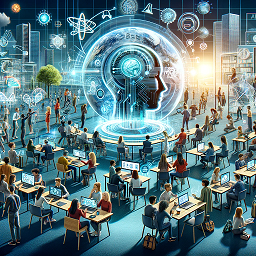Artificial Intelligence (AI) has rapidly evolved from a theoretical concept to an integral part of our daily lives. Initially emerging during the mid-20th century, AI is defined as the simulation of human intelligence in machines. This transformative technology now plays a crucial role in various domains including healthcare, finance, transportation, and entertainment.
AI operates through algorithms and machine learning models that learn from data patterns to make intelligent decisions. One of the most remarkable aspects of AI is its ability to mimic cognitive functions such as learning, reasoning, problem-solving, and language understanding. Examples range from virtual assistants like Siri and Alexa to more advanced systems like autonomous vehicles and sophisticated diagnostic tools in medicine.
Machine learning, a subset of AI, enables systems to improve over time with experience. Techniques such as neural networks and deep learning have seen significant advancements, enabling the creation of AI models that can outperform human experts in specific tasks. For instance, AI algorithms have shown remarkable accuracy in detecting diseases from medical images and have outperformed traditional methods in predicting financial market trends.
The application of AI in healthcare is particularly promising. AI-driven tools can analyze vast amounts of medical data to assist doctors in diagnosing conditions, personalizing treatment plans, and even predicting patient outcomes. For example, AI algorithms can sift through radiology images to detect early signs of cancer that might be missed by the human eye.
However, the rise of AI also brings ethical and societal challenges. Issues such as data privacy, algorithmic bias, and the displacement of jobs due to automation are areas of concern that governments, organizations, and societies must address. Ensuring that AI systems are transparent, fair, and accountable is essential for building public trust and maximizing the benefits of this technology.
Looking to the future, AI holds immense potential. Innovations like quantum computing promise to exponentially increase AI’s processing power, potentially solving problems that are currently intractable. Additionally, advances in natural language processing and general AI could lead to more intuitive and human-like interactions, further integrating AI into our day-to-day lives.
In conclusion, AI has come a long way from its inception, transforming various sectors by enhancing efficiency and providing novel solutions to complex problems. As we navigate the challenges and opportunities it presents, one thing is clear: AI will continue to be a driving force in shaping the future of technology and society.





